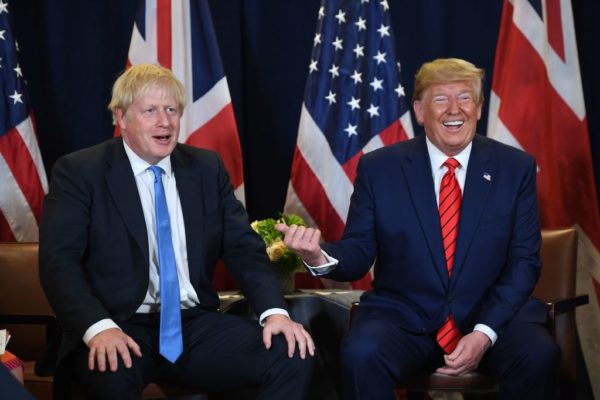Brexit trade leak reveals US pushback against UK stance on food, climate and environment
US refused to reference climate change while the UK said they were ‘in listening mode’ regarding the American approach to food standards

The US refused a UK request to reference climate change in any future trade agreement as it urged the country to move away from EU food, animal welfare and environmental regulations, leaked documents reveal.
Records of official meetings held by the US-UK trade working group – dramatically publicised by Labour leader Jeremy Corbyn this morning – show US trade representatives think “there would be all to play for in a No Deal situation” and are pushing the UK to follow US food and environmental rules.
A no-deal is now possible towards the end of next year, if trade negotiations between the EU and UK fail.
Johnson scrapped the commitment in Theresa May’s deal to stick to EU rules on the environment in October, as Trade Secretary Liz Truss said it was “vital for giving us the freedom and flexibility to strike new trade deals.”
Unearthed revealed last month that civil servants in the Department for Environment, Farming and Rural Affairs are concerned about coming under pressure from the UK’s trade ministry to weaken food standards in order to strike a trade deal with the US.
The secret papers show the two countries are far apart on their attitudes to the climate crisis. At a November 2017 meeting, the UK asked about including a reference to climate change in any deal given the UK’s “strong historical stance” and commitment to the Paris deal.
The US trade representative on the environment “responded emphatically that climate change is the most political (sensitive) question for the US, stating it is a ‘lightning rod issue’”. The US is bound by Congress not to mention greenhouse gas emission reductions in trade agreements, she said, adding that “this ban would not be lifted anytime soon”.
The EU has pledged to only strike trade deals with countries committed to the Paris agreement. Although recent EU deals with Japan and Mexico reference the accord, the principle has been tested during EU-US talks this year.
‘Listening mode’
At a November 2017 meeting of the working group, US officials encouraged the UK to “seek regulatory autonomy” after Brexit. Later US trade representatives described the “philosophical difference” between the US and EU approaches to food and environmental regulations.
US food and environmental standards are generally weaker than the EU’s. Brussels takes a precautionary attitude, sometimes called a hazard-based approach, to environmental and food policy, while the US takes a risk-based approach.
That means that some chemicals long deemed unsafe in Europe can still be used in the States, while American food producers are allowed to include small amounts of foreign bodies – like maggots, insect fragments and mould – in their products and adopt softer rules on welfare conditions for farm animals. In practice, US rules tend to lower the cost of food production.
Elise Vitali, chemicals project officer at the European Environmental Bureau told Unearthed that the EU’s approach “is the jewel in the crown of the EU’s world-leading chemicals and food regulations which offers a higher level of human health and environmental protection.”
“In the EU chemicals are regulated based on the intrinsic properties of the substances that make them dangerous, while the US approach focuses on exposure and looks at potential unacceptable effects. The EU’s approach is favouring prevention over cure. Industries have long been lobbying against it.”
US officials called the American food safety system “the gold standard” to which UK officials responded by stating they were “in listening mode”.
The prospect of US corporations selling chlorine-washed chicken into UK markets has been a symbolic issue for those concerned about the introduction of US food standards following a trade deal. This was addressed during the November meeting, with officials agreeing to “share their public lines on chlorine-washed chicken”.
At a later meeting in July last year, officials discussed Theresa May’s Chequers statement, which outlined the UK’s future relationship with the EU. US representatives were concerned that the UK had decided to align with EU sanitary and phytosanitary (SPS) standards as well as on agriculture.
SPS standards are measures to protect humans, animals and plants from diseases, pests or contaminants.
US officials said they were “deflated” and described the decision to align with EU SPS standards as the “worst-case scenario” for a UK-US trade deal. The UK has since abandoned the Chequers statement.
The materials also make clear US dislike for European regulations on pesticides and other chemicals.
During the meeting in November last year, American officials repeatedly referenced the EU debate over the regulation of the controversial weedkiller glyphosate, stating the EU process “can overrule the verified science and risk analyses”.
The leak comes two years since Unearthed revealed that former Trade Secretary Liam Fox tried to keep details of the working group’s meetings secret, raising concerns that the government was minded to accept lower food standards in exchange for a post-Brexit trade deal with the US.

